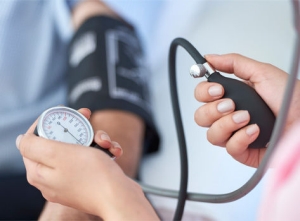The heart health experts at Atlantic Health System have the tools and resources to help you live a heart healthy lifestyle.
Joshua Weisbrot, MD, an Atlantic Health System cardiologist, joins a Community Conversation to discuss the importance of understanding your cardiac risk factors and provides insight on ways to take control of your heart health.
What are some of the simplest ways to improve heart health?
There are some basic ways to maintain and improve heart health and Dr. Weisbrot pointed to the recommendations of American Heart Association, called the Essential Eight, as a good place to start. They encourage people to eat healthy, stay physically active, quit tobacco, reduce stress, get enough sleep, control cholesterol, and manage weight, blood sugar and blood pressure. These lifestyle changes can help reduce one’s risk of heart disease.
How did the COVID-19 pandemic impact heart healthy habits?
Dr. Weisbrot observed that the COVID-19 pandemic impacted people in two ways: it motivated some to get healthier, while others were unable to see their doctors and fell behind on their hearty healthy habits. He acknowledged that the pandemic was a stressful time for many, and encouraged people to catch up on lifestyle factors that contribute to heart health. Dr. Weisbrot emphasized that it is important to have the support of friends and family to stay motivated to eat well, get active and exercise.
How are cardiac risk factors determined?
According to Dr. Weisbrot, typical risk factors for heart disease include high blood pressure, high cholesterol levels and high blood sugar, among others. Dr. Weisbrot said it is important to check with a doctor to determine how your individual risk factors can be controlled with lifestyle changes and medication. He also mentioned cardiometabolic factors such as weight that play a role in heart health. Atlantic Health System works with patients to get an understanding of the full spectrum of their risk and lifestyle factors that contribute to health and wellness.
Join Our Mailing List
Sign up to receive news and updates about our Community Conversations. This form is for North American residents only.
What role does genetics and family history play in cardiac health?
“Family history is really, really important, especially when we're thinking about cardiac risk,” said Dr. Weisbrot. “…(It) is something that we can quantitate to some degree. It’s not just is there any heart disease in your family? It’s who had heart disease? How close were they? Was it first degree relatives: mom, dad, brothers, sisters or children? How many of them? What age did it come on?” One of the challenges of heart health is that it requires both dedication to lifestyle choices as well as an understanding of one’s genetic predisposition of developing plaque, having a heart attack, and having a stroke. He noted that many patients become frustrated when they follow a heart healthy lifestyle and still experience high blood pressure or high blood sugar levels. Family history is just one piece of a complex puzzle that helps doctors determine the most effective plan to mitigate cardiac risk.
What tools are available to help determine cardiac risk factors?
Atlantic Health System has an interactive Heart Risk Assessment that provides comprehensive information on many factors that impact heart health. Dr. Weisbrot praised the tool for its ability to crunch data from multiple sources to come up with a personalized risk assessment score. “We've included pieces in our risk score to make it a more robust calculator…to get us to a level to figure out who's really at high risk and needs to get in and see a cardiologist…” Again, he emphasized that risk factors are part of a larger puzzle of family history and healthy lifestyle choices. Once a level of risk has been assessed, you should work with your doctor to determine if additional tests are necessary, including a heart CT, an echocardiogram, or a stress test, among others.
How valuable are calcium scores in determining heart health?
Calcium scores, which measure how much calcium is in your coronary arteries, can be an important part of an overall risk calculation and help doctors and patients to set goals around cholesterol levels and blood pressure. But Dr. Weisbrot cautioned that risk calculation is part of an overall health strategy and not meant to cause undue stress. “Calcium score testing and all this heart testing isn't about making people more anxious and feeling bad about their health, especially when we're on the cardiac risk end of things. It's to take control of it. It's to motivate you to be healthier and to make sure we do all that we can to lower your risk, but not to cripple people within the information and the worry.” He added that a proactive approach to cardiac health helps lower risk and mitigates the possibility of more severe consequences of undiagnosed cardiac disease.
How useful are personal health devices, such as those that measure heart rate and blood pressure?
Dr. Weisbrot said that it depends on the device and that doctors are studying the use of personal technology to monitor heart health. For instance, at-home blood pressure monitoring provides valuable information to doctors about the trends in a patient’s overall numbers and is useful for those with high blood pressure. Some wearable technologies, such as smart watches, provide rhythm monitoring and the ability to track palpitations for patients with arrhythmia. He noted that doctors are still learning how to best use the data gathered from these sorts of devices. Finally, Dr. Weisbrot noted the popularity of fitness trackers that tell users the number of steps they’ve taken in a day and said these devices can help motivate people to be more active.
What advantages are there to knowing your cardiac risk factors early?
Understanding your cardiac risk factors early puts time on your side. Smoking, high blood pressure and high cholesterol are all cumulative factors that increase risk over time. “The risk of cholesterol and blood pressure isn't about minutes or days. It's not what's my blood pressure now, what's my cholesterol now? It's what's it been over five and 10 and 20 years. There's growing consensus in the cardiology community that the goal for managing risk is going to be detecting this stuff early and…intervening early,” said Dr. Weisbrot. He acknowledged that there's stress and anxiety associated with testing and early diagnosis of heart disease, but that the cardiologists at Atlantic Health System are mindful and thoughtful about helping people manage their heart health. The primary goal is to motivate people to eat well, exercise and live healthier lives. “Knowing your risk means taking control, getting motivated, focusing on lifestyle, and (for certain patients), using medicines to lower that risk.”
What is atrial fibrillation and how does it affect heart health?
Atrial fibrillation (AFib) is a type of arrhythmia, an irregular, often rapid heart rate that can cause poor blood flow. Dr. Weisbrot said it is a relatively common condition. Many of the same lifestyle factors that impact other kinds of heart conditions apply to AFib. He mentioned alcohol intake as a particular risk and urged people to seek out information about the condition on the Atlantic Health System website.
Be Proactive About Heart Health
Stay up to date with your annual visits to prevent and detect more serious issues and learn about risk factors for heart disease.
Related Articles
Five Reasons to Connect With Your Primary Care Doctor
Keeping up with your heart health begins with your primary care doctor. Discover how staying up to date with your annual visits can keep you well -- and prevent or detect serious medical issues at their earliest stages.
The Importance of Knowing Your Blood Pressure
Your blood pressure numbers are key markers for heart health and can tell you more than you think. Learn what these numbers mean, what factors contribute to a healthy blood pressure and what medical problems can arise when left unchecked.
5 Things Raising Your Risk for Heart Disease
Genetics play a role in your risk for heart disease, but it’s not the only factor. Learn the top 5 things raising your risk for developing heart disease.
Patient Success Story: Joe P.
Joe’s AFib made him a candidate for the AdmIRE clinical trial. Learn why he said “yes” to participating and how electrophysiologist Jonathan Sussman, MD, healed Joe’s heart.




